23.10.2023
Rückblick: Interdisziplinäre Summer School T*ECO*LOGIES
Organisation & Veranstaltung: Prof.in Dr.in Cornelia Breitkopf, Dr.in Sandra Buchmüller, Annika Leonie Jung (SHK), Mathew Martin (SHK)
Teilnehmer:innen: 25

Begrüßung der Teilnehmer:innen im Hörsaal, Institut für Entergietechnik, TU Dresden
Am 17. und 18. August 2023 fand die Summer School T*ECO*LOGIES am Institut für Energietechnik der Fakultät Maschinenwesen im Merkel-Bau der TU Dresden statt. Die Organisatorinnen, Cornelia Breitkopf, Professorin für Thermodynamik, und Sandra Buchmüller, Gastprofessorin mit dem Schwerpunkt feministische Technikforschung und -gestaltung, waren überwältigt von der Resonanz auf die Veranstaltung. Trotz Urlaubszeit und hochsommerlichen Temperaturen folgten 25 Personen der Einladung, sich an zwei Tagen mit Perspektiven auf Geschlecht, Körper-/ Neurodiversität und Ökologie im Verhältnis zur Technik auseinanderzusetzen – Themen, die in den Ingenieurwissenschaften normalerweise nicht im Zentrum stehen, in Anbetracht aktueller sozialer und ökologischer Probleme jedoch von zentraler Bedeutung sind. Die meisten Teilnehmer:innen kamen von der TU Dresden, einige auch von der TU Chemnitz, der JGU Mainz, der Universität zu Köln, sogar eine Ingenieurin aus Shanghai war dabei. Sie brachten unterschiedliche Erfahrungen und Perspektiven aus dem Maschinenbau, der Elektrotechnik, der Biotechnologie, der angewandten Physik, der ingenieurwissenschaftlichen Hochschuldidaktik, der Medieninformatik, den Erziehungs- und Medienwissenschaften, der Technikgeschichte und Hochschulforschung, der Technik- und Umweltsoziologie, den Gender & Queer Studies, der Theologie, dem Wissenschaftsmanagement zwischen Gesellschaft und Technik und der außeruniversitären Frauen- und Mädchenförderung mit.
| 1. Tag | 2. Tag |
|---|---|
|
Workshop 1 |
Workshop 2 |
| Vortrag & Diskussion Prof.in Dr.in Cornelia Breitkopf: Geschlechterkonstruktionen am Beispiel der Thermodynamik (German) |
Workshop 3 Human Nature Technology. Perspectives through Design Veranstalterin: Ines Weigand, Weizenbaum Institut/Universität der Künste Berlin |
Am ersten Tag begaben sich die Teilnehmer:innen auf verschiedene Entdeckungstouren über den Hauptcampus der TU Dresden und kehrte mit Karten und Detailbeobachtungen zurück, die anhand von Straßennamen, Gebäudebezeichnungen, Hinweisschildern, Skulpturen, Fassadenornamenten, oder auch zugewiesener Räume deutlich veranschaulichten, dass die Ingenieurwissenschaften nicht nur in der Geschichte, sondern auch in der Gegenwart von Männern geprägt ist. Nachmittags zeigte Prof.in Dr.in Cornelia Breitkopf in ihrem Vortrag zu Geschlechterkonstruktionen in der Thermodynamik, wie historisch bedeutsame Wissenschaftler aus ihren naturwissenschaftlichen Theorien und Annahmen Argumente ableiteten, warum Frauen für die Wissenschaft nicht geeignet wären.

Ergebnispräsentation der Entdeckungstour im Foyer (Workshop 1)
Am nächsten Tag verdeutlichte das Kunst- und Designforschungsduo MELT am Konzept des „Technoabelism“, dass die Herstellung und Gestaltung von Technik immer bestimmte körperliche und geistige Fähigkeiten der Nutzung voraussetzt. Am Beispiel von Cindy – eine Frau, mit Amputationen unterhalb der Knie und mehrerer Gliedmaßen an den Fingern – und der von ihr umgestalteten Alltagsgegenstände, die auf der Website „Engineering at home“ (http://engineeringathome.org/) dokumentiert sind, wurde verdeutlicht, welche Anpassungsleistungen Nutzer:innen erbringen müssen, die keine „Normalkörper“ haben. Im dritten Workshop zeigte Ines Weigand, wissenschaftliche Mitarbeiterin am Weizenbaum Institut der Universität der Künste Berlin, an Beispielen wie Agbogbloshie, der Müllhalde aus Elektroschritt in Ghanas Hauptstadt, den Kleidungsbergen in der Atacama Wüste oder Mikroplastik in den Ozeanen, welche globalen Auswirkungen die Produkt- und Technikentwicklung der westlichen Welt im Dienste des Konsumkapitalismus haben. Sie nutzte diese Bilder, um zu verdeutlichen, dass das was wir gestalten, auf uns zurückwirkt. Feministische Ansätze, auf die sie referenziert, trennen somit nicht mehr zwischen Natur und Kultur, sondern sprechen von unserer Umwelt und Existenzweise in der NaturKultur, in der wir nicht nur Sorge für uns selbst, sondern auch für andere menschliche und nicht-menschliche Lebewesen und Realitäten zu tragen haben. Zur Vergegenwärtigung dieser Symbiose und Sorgebeziehung erhielten alle Teilnehmer:innen zum Schluss der Veranstaltung ein Fläschchen Algen mit auf den Weg und ein Stück Plastikschlauch, das zur Beatmung der Algen diente, die sich von CO2 ernähren.
Durch die unterschiedlichen Erfahrungen und Hintergründe der Teilnehmer:innen und die Themen der Summer School ist ein Austausch über Disziplinen-, Qualifikations- und Altersgrenzen hinweg gelungen, der verdeutlichte – so meldeten die Befragten der anschließenden Online-Umfrage zurück – wie wichtig es ist, andere Blickwinkel und Positionen einzunehmen, besonders in Wissenschafts- und Forschungsfeldern wie den Ingenieurwissenschaften, deren Ergebnisse so weitreichende Konsequenzen haben, die uns alle – wenn auch in unterschiedlichem Maße – betreffen.
